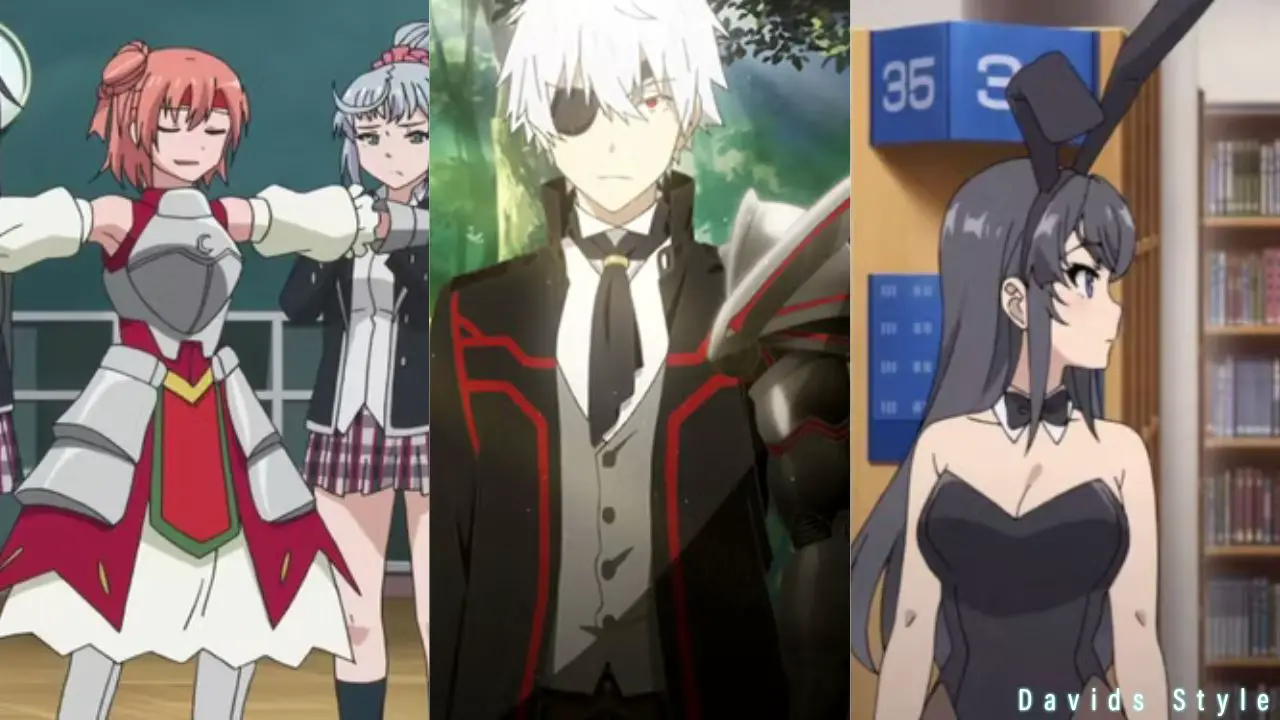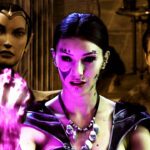In the realm of anime entertainment, audiences are spoiled for choice, with numerous options originating from various forms of media before receiving popular anime adaptations. The process of adaptation is undoubtedly challenging, irrespective of the mediums involved. However, it has the potential to give rise to extraordinary tales that surpass their original source material. Light novels, akin to manga, convey stories through a combination of illustrations and dialogue, though they typically have a shorter length and lack the ongoing narrative intended to endure for years. Regrettably, there exists a plethora of lackluster anime adaptations that fail to capture the subtle intricacies and enchantment found in their highly successful light novel counterparts.
1. Boogiepop
Diving into the world of Boogiepop, a captivating series of light novels penned by Kouhei Kadono and brought to life by the illustrations of Kouji Ogata. These novels delve into the enigmatic character known as Boogiepop, an apocryphal figure said to whisk away girls and serve as a controversial moral guardian for society. Within the Boogiepop universe lies a vast tapestry of interconnected stories, spin-offs, and daring narrative experiments that the light novels have fearlessly tackled.
However, when it comes to its anime adaptation, Boogiepop Phantom encounters difficulties in fully encompassing the depth and breadth of its source material. The attempt at episodic storytelling within the series feels fragmented, leaving little room in its mere dozen episodes to truly delve into the intricacies of this supernatural tale. As a result, the anime adaptation falls short in properly exploring the captivating world crafted by the original light novels.
2. Grimgar Of Fantasy & Ash
Grimgar of Fantasy and Ash treads familiar ground in the fantasy genre, employing RPG mechanics to weave its narrative. While it may not revolutionize the genre, this series of light novels gradually finds its stride, with its archetypal characters defying expectations and evolving.
Set in a world where a group of underwhelming fantasy protagonists must unite and persevere against the odds after being abandoned by stronger warriors, Grimgar: Ashes and Illusions, the 12-episode anime adaptation, feels superfluous. It merely scratches the surface of deconstructing its source material, condensed into a series that falls short in leaving a lasting impact. The brevity of the adaptation hampers its ability to delve deeper into the story’s nuances and fails to fully capture the essence of the original light novels.
3. A Certain Magical Index
A Certain Magical Index stands out as an exceptional fantasy-adventure series, propelled by the captivating duo of Toma Kamijo and Index, whose extraordinary abilities hold the power to reshape the world. With the advantage of three seasons, the anime adaptation of A Certain Magical Index successfully encompasses the entirety of the light novel series.
However, despite its accomplishments, certain compromises are inevitable, resulting in the anime often feeling like a streamlined rendition of the intricate world presented in the light novels. Meanwhile, the light novels continue to flourish by expanding this enchanting universe through compelling spin-offs, some of which rival the strength of A Certain Magical Index itself. This wealth of additional lore grants the light novels an undeniable edge over their animated counterpart, allowing readers to delve deeper into the expansive tapestry of this magical realm.
4. Rascal Does Not Dream Of Bunny Girl Senpai
Rascal Does Not Dream of Bunny Girl Senpai stands as a psychologically intricate franchise, delving into the authentic portrayal of individuals grappling with genuine afflictions, such as the protagonist’s “Puberty Syndrome.” While the bunny-clad enigma may initially attract audiences, the anime adaptation of Rascal Does Not Dream of Bunny Girl Senpai primarily offers surface-level gratification, missing out on the underlying complexities.
The anime fails to fully capture the profound issues that lie beneath the surface. While it conveys a message, those seeking a deeper understanding of the characters and a genuine connection to their unique struggles will find solace in exploring the light novels. By delving into the written works, readers can truly comprehend the intricacies of the characters’ experiences and empathize with their distinctive plight. The light novels provide the necessary depth and insight for a more profound engagement with the story and its multifaceted themes.
5. Toradora!
Toradora! offers a delightful slice of life romance, striking a balance that keeps the story engaging without overstaying its welcome across its ten volumes. This concise length makes it an ideal candidate for adaptation into an anime series, particularly since the light novels had already concluded before the anime went into production.
The Toradora! anime successfully captures many essential elements and excels in delivering the tantalizing “will they/won’t they” tension between Taiga and Ryuji, which serves as its secret weapon. However, it is in the light novels where these characters, especially Ryuji, find even greater breathing room. While some viewers may grow frustrated with Ryuji’s occasional ambivalence in the Toradora! anime, the light novels provide the necessary context to understand and appreciate these actions fully. By exploring the written works, readers can gain a deeper understanding of Ryuji’s transgressions and their underlying motivations, enriching the overall character development and narrative experience.
6. My Youth Romantic Comedy Is Wrong As I Expected
Unconventional romantic comedies that navigate the realms of slice-of-life storytelling often yield exceptional results, particularly when they revolve around introspective loners. Such is the case with Hachiman Hikigaya and Yukino Yukinoshita, who find themselves dispensing advice to their fellow students as members of the Service Club.
Known as My Teen Romantic Comedy SNAFU in its anime adaptation, the series spans three seasons, effectively encompassing the breadth of the captivating light novels. While the anime rendition of My Teen Romantic Comedy SNAFU is undeniably commendable, it is the source material that truly excels in delving into Hachiman’s psyche and unraveling the full extent of his psychological complexity.
The light novels offer a more profound exploration of Hachiman’s inner thoughts and emotions, allowing readers to gain a comprehensive understanding of his character. It is through the written works that the true depth of Hachiman’s journey is revealed, surpassing what the anime portrayal can achieve.
7. Classroom Of The Elite
Classroom of the Elite immerses readers in a suspenseful school series where the pursuit of a good education resembles an unending death game with no means of escape. Despite its gripping premise, Classroom of the Elite faces its greatest challenges in terms of pacing, which not only hampers the overall storytelling but also casts a shadow over the series’ protagonist.
The key distinction lies in the portrayal of Ayanokoji and his motivations for engaging with others and striving to fit in. This difference in character development significantly enhances Ayanokoji’s appeal within the light novels. While Classroom of the Elite has made strides in improvement over time, with an upcoming third season offering hope for further refinement, the pacing issues still persist. It is my sincere expectation that the forthcoming season will address these concerns and steer the series towards a more satisfying trajectory.
8. The Executioner & Her Way Of Life
The Executioner and Her Way of Life, a relatively new light novel series, has garnered a favorable reputation through its 12-episode anime adaptation. Within this imaginative tale lies a refreshing twist on the fantasy genre, centered around the concept of immortality, while still maintaining tangible stakes.
However, where the light novels truly shine is in their ability to expand the world’s magic system and breathe life into the intricacies of spellcasting. These mechanics, which are meticulously detailed in the books, take a backseat in the anime adaptation, which inevitably falls short due to its limited duration. The Executioner and Her Way of Life light novels captivate readers with their nuanced exploration of the magic system, making for an immersive and engrossing reading experience that the anime adaptation simply cannot replicate within its condensed format.
9. Arifureta: From Commonplace To World’s Strongest
Arifureta: From Commonplace To World’s Strongest revolves around a straightforward power fantasy narrative, where a bullied outcast undergoes a transformative journey, becoming a warrior adorned in formidable armor after being transported with his classmates to a fantastical realm. While the story in Arifureta may not boast originality, the light novels compensate with exhilarating combat sequences and dynamic action.
Apart from issues with storytelling and character development, the visual presentation of the Arifureta anime falls short, reminiscent of lackluster material from the 2000s that fails to capture the essence of the source material. The anime adaptation feels dated, lacking the ability to fulfill the promise of the original content. In contrast, the light novels maintain a timeless aesthetic that continues to captivate readers, providing a more immersive and visually satisfying experience than their animated counterpart.
10. Sword Art Online
Sword Art Online stands as one of the most significant anime sensations of the past decade, but it may come as a surprise to audiences that the light novels offer an even more captivating rendition of this tale. Sword Art Online effectively establishes a new benchmark for the MMORPG adventure genre, yet the anime adaptation faces notable criticism, particularly concerning its protagonist, Kirito.
In the anime, Kirito can be perceived as more insufferable, as crucial backstory that serves to better justify his behavior is omitted. This omission significantly impacts the contextualization of Kirito’s character and casts Sword Art Online in a different light altogether. The light novels delve into these essential details, providing a deeper understanding of Kirito’s motivations and shedding new perspective on the story as a whole. Exploring the written works allows readers to appreciate the nuanced complexities of Kirito’s journey, elevating the overall narrative and offering a richer experience compared to the anime adaptation.



.jpg)
.jpg)
.jpg)
.jpg)
.jpg)
.jpg)
.jpg)
.jpg)
.jpg)
.jpg)





